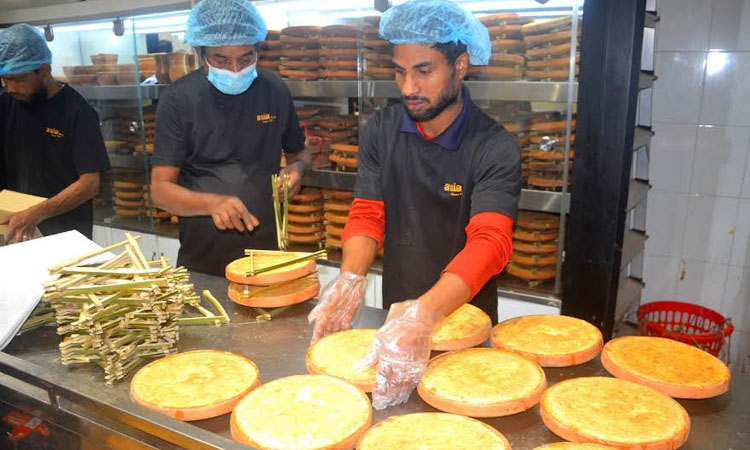News Flash

By Kalam Azad
BOGURA, Sept 28, 2025 (BSS) - Bogura's yoghurt, a delicacy distinguished by its taste and quality, has long stood as a cultural emblem of the district. Revered across generations, this iconic food item has transcended national borders, earning admiration far and wide.
Originating as sour curd nearly two and a half centuries ago, the yoghurt gradually transformed into its sweetened form through the hands of local artisans. Its evolving flavor profile not only enriched culinary traditions but also fostered a thriving industry, providing livelihoods for thousands. The product's legacy was further cemented with the prestigious Geographical Indication (GI) recognition.
From festive feasts to heartfelt gifts, Bogura's yoghurt remains unmatched in its appeal. It has become a staple of social gatherings, weaving bonds of kinship and tradition across households.
History of Bogura's yoghurt:
The history of Bogura's yoghurt dates back about 250 years in what is now Sherpur Upazila of the district. Initially prepared by the Ghosh family, it gradually passed on to the Muslim community and other established entrepreneurs.
Ghetu Ghosh of the Sherpur Ghosh family was the pioneer, starting with sour yoghurt, which later transformed into sweetened curd through generations.
Another person, Nilkanta Ghosh of Sherpur's Ghoshpara, about 150 years ago expanded the fame of earthen-pot yoghurt.
In the late 18th century, under the patronage of Nawab Altaf Ali Chowdhury, father of former Pakistan Prime Minister Mohammad Ali, local resident Shri Gour Gopal Pal began production in Bogura town. His descendants, Shri Bimal Chandra Pal and Shri Swapan Chandra Pal, still run the historic shop "Shri Gour Gopal Dadhi and Mistanna Bhandar" on Nawabbari Road.
Initially, the yoghurt was supplied only to Nawab and Satani families, earning the name "Nawabbari yoghurt." In the Nawabi era, it was a delicacy, but it later spread across northern Bangladesh, becoming a common feature in weddings, birthdays, Eid, Puja, Aqiqah, Hal Khata, and family gatherings nationwide.
Global Acclamation:
Local traders say Bogura's yoghurt has reached far beyond Bangladesh; even the Queen of Britain once tasted it. In 1938, yoghurt from Bogura was first sent to England. After independence, alongside Gour Gopal, names like Moharrom Ali and Rofat Ali of Baghopara gained prominence in yoghurt-making. Traditionally, yoghurt was set in small earthen pots, locally known as "hari," carried on shoulders and sold by hawkers.
Today, yoghurt has become an integral food in Bogura, with showrooms in every corner of the town. Among the most reputed are Asia Sweets, Chitipata, Shyamoli Hotel and Restaurant, Rofat Doi Ghar, Moharrom Ali, Sherpur Doi Ghar, Saudia, Jolojog, Shompa, Baikali, Shuvo Dadhi Bhandar, Ruchita of Nawabbari, Doibazar, Mistimohol, and Akbaria, along with countless small shops under various names.
Daily Yoghurt Production:
At least 400 factories, big and small, now produce yoghurt in Bogura, with an average of 50 tonnes a day. The daily turnover reaches nearly one crore Taka (Tk 10 million), while its quality has enabled exports to India, Nepal, and other countries.
Traders recalled that in 2009, Bogura yoghurt was showcased at the International Trade Fair in Siliguri, India.
GI Recognition and New Opportunities:
Two years ago, Bogura's traditional yoghurt earned GI recognition, unlocking new opportunities for businesses. Traders now expect international exposure but stress the need for an international airport and export-processing facilities to expand globally.
On June 26, 2023, the Department of Patents, Designs, and Trademarks (DPDT) under the Ministry of Industries granted GI status after verification, in line with World Intellectual Property Organization (WIPO) rules. The GI Act was enacted in 2013, with regulations formulated in 2015, initiating the registration process.
According to DPDT, products shaped by the soil, water, climate, and cultural practices of a specific area qualify for GI recognition. Usually, natural, cultural, and production-based items earn this status.
The GI approval has delighted local traders, who had campaigned for years. They see it as the dawn of a new era for Bogura's yoghurt industry.
Prospects and Challenges:
Among leading brands, Asia Sweets has made a name in Bogura under the leadership of three brothers-Md Nurul Bashar Chandan, Nurul Alam Tutul, and Nurul Huda Tilok.
Md Nurul Bashar Chandan said, "GI recognition has created a huge opportunity for us. It will bring multiple benefits in exports. But to reach the global market, government support is vital."
He pointed out that yoghurt has a limited shelf life, requiring delivery within 24 hours. Without swift air transport, its taste and quality deteriorate. "Exporting requires an international airport in Bogura. Transporting via Dhaka consumes too much time," he added.
Shyamoli Hotel and Restaurant General Manager Jamil Khan said that the key ingredient for yoghurt is quality milk, and better milk produces better yoghurt, adding, "But skilled artisans are equally crucial; otherwise, the materials can go to waste."
He noted that with milk and other essentials becoming costlier, prices have risen, though demand has not decreased; in fact, it has grown further.
Alhaj Enamul Kabir, owner of Enam Doi Ghar in Jhautala, said that maintaining quality in this competitive market is tough, as low-grade yoghurt dominates, making it difficult to sell high-quality products at higher prices.
He added that reducing prices hurts quality, yet people from across the country continue to visit Bogura to taste its yoghurt.